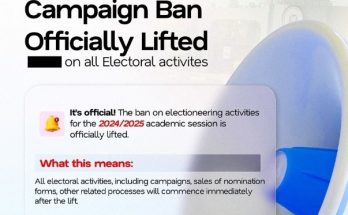By: Odo Christian Obinna
We are met with a lot of traffic both on foot and in vehicles at the main entrance gate. The enormous sky-blue monument is back up amid a frenzy of activity, reflecting the usual bustle of the daily life of the good old days. Nigeria’s premier university, the university of Ibadan, has just resumed physical classes. The flurry of activity in front of this massive monument on this day, in particular, draws attention to the truth of the recently discovered missing component—physical resumption. Finally, students are free of the virtual learning suffocation that has pervaded life at the top university since 2021. As a result, the main entrance gate serves as the focal point of these strangling physical actions, and both returning and old students are already immersed in life outside the ordinary abstract environment of virtual reality.
We turn around at the entrance gate and proceed to Agbawo, the second colony of life next to the entrance gate. The community of Agbowo, which is close to the University of Ibadan, is where most students live after the university. Both former and present students cherish their memories of this town and occasionally refer to it as their own country—the United States of Agbowo—because of what it stands for. The reality we encounter here differs slightly from the one we first encountered at the entrance gate. From all indications, the typical life of intense activity following physical resumption appears to have lost its loud voice to the issues of daily life in Agbowo, bringing to light the less-discussed reality of the other side of resumption.
These are issues, and problems that have many vile aspects, but the most well-known is the anticipated conflict between students and their landlords. Due to the recent conflict between the Academic Staff Union of Universities (ASUU) and the Federal Government, these students were forcibly placed on a home lockdown for months. Unfortunately, their rents were not courteous enough to join the striking lecturers in their strike; they continued to run unabated. The implications of this lack of comradeship and solidarity are that either these students are returning to expired or near-expired rentals. The euphoria of resumption takes a backseat as a result of the increased tension, unsettling mood, panic, and uncertainty.
Major Salawu Street has an extremely chilly atmosphere today where hurry and talkative stillness clash. Only Joshua, his roommate, their landlord, and their headache exist in their alternate reality. The issue is not that their lease is due to end; rather, it is how to persuade the landlord to accept that their parents have no money stashed away anyplace so that they may have at least a month’s grace to renew their lease. The plot is the same at Ojokondo Street and just a few small aspects are different; say the actors involved. We encounter a student here who simply goes by the name of Tosin and bemoans her situation to everyone who will listen. The reason for her wailing is posted on the front door. The landlord expresses his faith in the renters’ continued cooperation in bold characters at the end of the letter. Aside from the rent that needs to be renewed, electricity bills and other expenses have accumulated. The weight of all of these culminated in the heavy “ahn” that she let out of her mouth at the conclusion of her harrowing story. Okenyi Sunday Chinweike, a law student and another tenant, lamented that the rents lost consecutively during the Covid-19 lockdown and the subsequent two strikes were a bad investment with no return on investment. He described the situation as difficult for both independent students and parents.
Returning to UI, the scenario there, especially in Awolowo hall, encourages us to experience the realities of rush hour. Not the typical Christmas rush, but the one that will come later. With a new foreman, UI is set up for an accelerated calendar, which is reflected in the fact that the school will finish a session in roughly seven months, according to the revised calendar released by the school’s Senate. Students, who are accustomed to a leisurely academic schedule, find this trend particularly unusual. Even though this “strangeness” is expected, students are not unaware of what this “strangeness” means for their social and academic lives—less partying and more and more studying. So, this attitude is embodied by the situation we encounter in one of these rooms. Ochumba Lilian Ifunanyachukwu, who had just returned from the East and had yet to unpack her luggage, has already erected a fortification of open books and materials around her. The fact that she still lacks a project topic in a department where even the finalists are required to offer a minimum of twelve courses per semester only makes her situation worse. In addition, she is at a loss for how to fit in other, equally crucial elements of her life outside of academia.
Somewhere in the Eastern city of Enugu, we meet Onyishi Christian, a law student of the school. He has been unable to return to class because of an illness that has kept him confined to his room. The hospital-like smells of medication and the crispy scents of fresh-printed textbooks coexist in this immaculately organized room, while the sounds of volumes being shuffled drown out the sound of herbs shaking. In his own words, the days ahead will need students to adjust, and despite being ill, he is already “buckling up to cushion” the impact of the calendar in advance.
For his part, Chinweike describes the days ahead as hellish, but he has faith in the ability of the students to adjust. If push comes to shove, as Joshua advised, students must find their strength in God, that ever-conscious presence.
The story is very different for the 400-level students of law since they inhabit a totally different reality. The numb reality of yet another virtual semester drowns out the customary thrill that comes with physical resumption. While a student who does not want his identity published in this piece, acknowledges the flexibility of virtual classrooms, he laments the inevitable difficulties of the virtual regime, such as the cost of data, electricity to power learning equipment, and spending lengthy periods of time stationery. Another student raises his concerns about the system while requesting anonymity. He makes the observation that students in virtual classes have short attention spans and may fall asleep after sitting still for an extended period of time.
In the midst of all this, some students are returning to school without a place to lay their weary heads down, either because their rents have long since expired or because they were unable to resolve housing problems prior to the lengthy strike. The National Council of Enugu State Students, UI branch, has made this group of persons a top priority as it works to reintegrate its returning members and non-members who are having trouble finding housing. Nwodo Felix Odinaka (Shakespeare), the association’s president, explains these difficulties and how his office has aided students who fall into this category by connecting them with others who live alone or require roommates.
No doubt, physical resumption is definitely in the air, but students often have personal issues that need to be addressed. They are not at all as loud as resuming. They arrive quietly, which may upset the students’ mental health. If you can, assist your fellow students. If you are unable to, the least you can do is demonstrate that you care, keeping in mind that, unless proven otherwise, every student has shoes on and only they are aware of their true sizes.
Note: some names were changed




